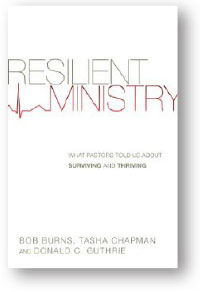 Resilient Ministry: What Pastors told us about Surviving and Thriving
Resilient Ministry: What Pastors told us about Surviving and Thriving
Bob Burns, Tasha Chapman, and Donald C. Guthrie
Early in my career, someone told me that being in ministry for a certain number of years doesn’t necessarily mean you have that many years’ experience: you might simply have one year repeated a number of times. That statement has stuck with me, so the title of this study captivated my interest. It’s not good enough to survive in ministry – there must also be fruitful thriving.
Resilient, fruitful ministry
A total of 73 pastors and spouses from a wide range of geographical and denominational backgrounds in the United States participated in this research project, meeting in small groups six times over two years. From the data collected, five primary themes emerged for leadership resilience in fruitful ministry:
- spiritual formation
- self-care
- emotional and cultural intelligence
- marriage and family
- leadership and management
At the end of each section, the authors provide brilliant questions that help the reader make personal applications to life and ministry. The appendix makes the book worth purchasing as it contains a wealth of information and templates, including personal evaluation and annual reviews, an emotions checklist, family diagrams, and best practices for forming peer cohorts.
Put your own mask on first
The first four themes deal primarily with self-care whereas the final theme addresses skills for a leader to fruitfully minister to others.
When you travel in an aircraft, you are always told in the safety instructions that if there is a change in cabin pressure an oxygen mask will be provided. You are to put on your own mask first and then assist your children and others with their masks. At first, this sounds selfish but it’s not self-focused: you cannot help others if you are incapacitated.
So it is in ministry: development of resilience transcends accomplishment of ministry tasks. Resilience focuses on who the pastor is and how that influences what a pastor does. Knowing the right things and developing skills to accomplish ministry tasks are important, but they are usually not the reasons people leave ministry. Ministry-killing issues are matters of life skills, behaviour patterns, and character.
Poetry and Plumbing
The final theme caught my attention and presents some fresh approaches to the subject of leadership. Leadership is compared to poetry and management to plumbing.
“Poetry” is the more creative and ambiguous part of leading. The authors dare to mention the art of “perceiving the politics of ministry” as a skill that must be learned to develop the poetry of leadership. Church politics is often viewed negatively, yet it is a reality: “Whenever people actively promote their interests, they have entered the realm of politics,” the authors write.
The plumbing aspect of leadership focuses on the daily operational responsibilities in ministry. “Plumbing” deals with things such as modelling, shepherding, managing expectations, supervising conflict, and planning. These are all things that test our ability to keep the plumbing working, and the authors indicate that the leadership diagnostic question is, “What comes out when our leadership is squeezed?”
“No time” not new
There’s a fair amount of repetition in the book as sub-themes run through all of the five main themes. Two examples include stress on knowing and understanding your family of origin and a huge emphasis on taking time for reflection in our fast-paced world.
In the midst of situations, leaders must draw on a repertoire of prior learning. The authors call this reflection-in-action. However, the authors counsel, after the experience, to add to the repertoire of positive experience, a leader must also engage in reflection-on-action.
Although I resonate with the authors’ many references to the fast pace of life, I think we use this as an excuse to amplify the difficulty of ministry today. The book’s emphasis on the need to work at reflection leaves the impression this is a new challenge. In my four decades of ministry, I’ve always experienced difficulty in taking the time for reflection. Yes, the pace 40 years ago was different, but everything we did also took longer.
I remember very little from high school literature classes, but I do remember William Henry Davies’ poem “Leisure.” Written in 1911, its words are true for today: “A poor life this if, full of care, We have no time to stand and stare.” I’m grateful for the emphasis on the need for reflection; however, it certainly is not new.
Holy Spirit empowers
Although the study includes a good amount of Scripture, I felt there was a lack of emphasis on the involvement of the Holy Spirit in empowering and enabling people in ministry. The process for surviving and thriving as detailed by the authors seemed mechanical.
At times, I felt the authors’ comments could support and promote pastors to enter “pity party” mode. For example, the study revealed the difficulty for pastors to separate their personal identity from their role in ministry. Without a doubt this is difficult; however, pastoring is not the only career in which individuals are known by their occupation. I was raised on the farm; my dad was known as a farmer. The difference between farming and spiritual shepherding is that pastors can easily fall into the trap of allowing their professional identity to become their Christian identity. I wish this study would have included some “perks” in ministry which, if overlooked, can lead to discouragement, self-pity, and termination of ministry.
The content of the book certainly has the potential to help pastors to not only survive but also to thrive in ministry.
—Ralph Gliege is conference minister for Saskatchewan Mennonite Brethren, and a member at Living Hope, Saskatoon.